|
May 2019

Issue Home >>
|

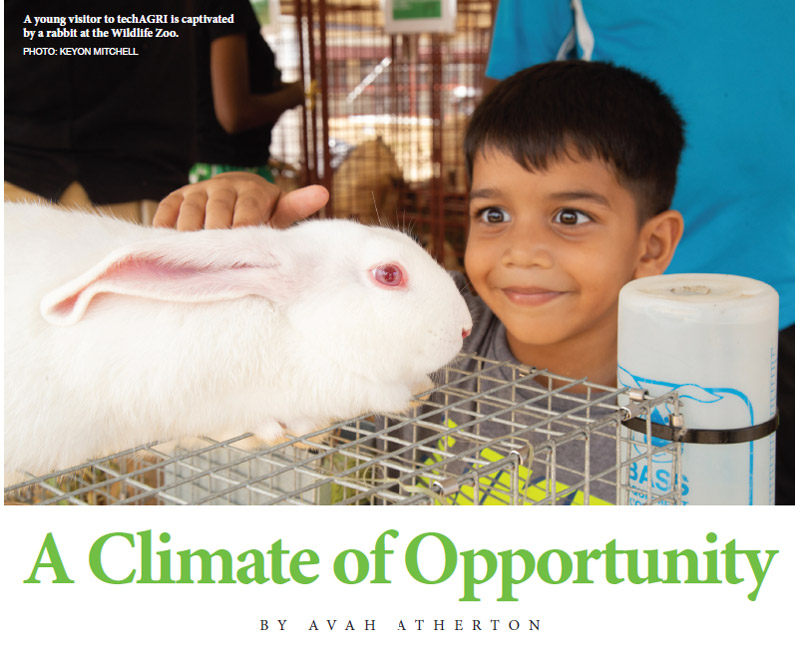
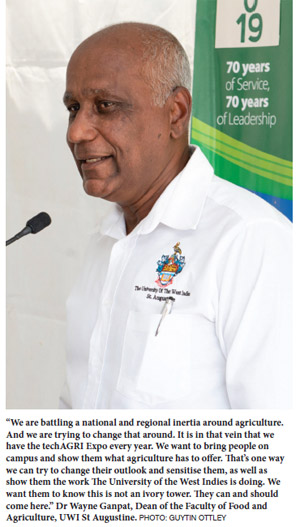 On the western field behind the Old Administration Building of the St Augustine Campus of The University of the West Indies, the Faculty of Food and Agriculture (FFA) hosted the third installment of its techAGRI Expo 2019 under the theme “Technology. Innovation. Entrepreneurship” on March 29 to 31. Adults and teens wandered between the booths, pausing to learn more about whatever captured their interests while in the background, children screamed joyfully from the interior of a bouncy castle. On the western field behind the Old Administration Building of the St Augustine Campus of The University of the West Indies, the Faculty of Food and Agriculture (FFA) hosted the third installment of its techAGRI Expo 2019 under the theme “Technology. Innovation. Entrepreneurship” on March 29 to 31. Adults and teens wandered between the booths, pausing to learn more about whatever captured their interests while in the background, children screamed joyfully from the interior of a bouncy castle.
There was a full schedule of events and activities over the three days, including a mini market, wildlife zoo, workshops, food village and agricultural displays. This, the largest technology and agriculture show in the country, can be considered a sample of the potential for growth and innovation taking place in these industries. TechAGRI, if nothing else, is an ambitious tool in attempting to influence people's attitude towards climate change, food security and their responsibility as key stakeholders in a rapidly changing world. These issues are the elephant in every room in every home across the world.
Recent initiatives by Government ministries to mitigate the risks involved in climate change have been highlighted in local media reports over the last few months. Severe weather patterns have affected the populace in significant ways – increased water shortages, rising temperatures and impromptu flooding. Internationally, abnormal weather conditions have affected every continent and countries have been forced to take drastic measures. In South Africa, there are talks about towing an iceberg from Antarctica, 2,000 kilometres over, to combat Cape Town’s growing water crisis. We´re not yet in need of an iceberg but water security is just the tip of larger environmental problems we must all face. Locally, discussions are ongoing about water conservation and security, such as limiting the excessive or unnecessary use of water in private and public consumption.
At techAGRI, a number of different vendors showcased hydroponics systems for both the home gardener and the commercial farmer. The booth operated by FFA drew a crowd, with patrons signing up for the agri business training and development series. The Landscape Management course highlighted plants that grow well with minimum water and the Hydroponics course's tagline stated boldly “Grow Plants without Soil!”. These aren’t untapped resources, as the sign-up list showed, people of all ages are sitting up and taking notice. Perhaps change is coming.
Over at the Trinidad and Tobago Beekeepers’ Association’s tent, there was a literal buzz; patrons exclaimed over the honey on offer while bees swarmed around an enclosed comb, indifferent to the curious stares. Their honey was a marvel, with different flavours and colours on display from both islands. The Association offered samples of over five types of honey, demonstrated the equipment used at apiaries and explained how they collaborate with local government to assist in the safe removal of hives from public spaces and the proposed implementation of pollinator corridors using bee friendly trees. One of the most alarming indicators of our environmental crisis is the sharp decline in wild honey bees. Without these hard workers pollinating our trees, food security cannot be guaranteed.
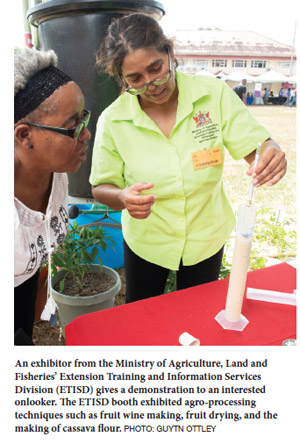 Farmers from as far as Rio Claro attended the expo, offering a glimpse at adaptive agricultural methods. Fruits which were previously relegated to colder climes, now flourish in our warmer temperatures. Strawberries, nectarines and peaches were amongst those on offer, the farmers patiently explained proper techniques to care and harvest these foreign goods. Nestled between them were familiar plants, a pommecythere tree with young fruits and citrus trees, the smooth green leaves of a lime tree easily recognisable. No need for acres of land to harvest these fruits, they've been adapted for medium-sized pots and even indoor living in some cases. Farmers from as far as Rio Claro attended the expo, offering a glimpse at adaptive agricultural methods. Fruits which were previously relegated to colder climes, now flourish in our warmer temperatures. Strawberries, nectarines and peaches were amongst those on offer, the farmers patiently explained proper techniques to care and harvest these foreign goods. Nestled between them were familiar plants, a pommecythere tree with young fruits and citrus trees, the smooth green leaves of a lime tree easily recognisable. No need for acres of land to harvest these fruits, they've been adapted for medium-sized pots and even indoor living in some cases.
Home gardening is one of the free courses on offer at the Ministry of Agriculture, Land and Fisheries, giving everyone a chance to develop a green thumb. Another exhibitor was WHYFarm, a local NGO with a mandate to promote food security using agricultural education and entertainment. AGRIman and his trusty sidekicks, farming superhero characters, greeted visitors at their booth and the accompanying comic book drew a young crowd. We Help You-th Farm (WHYFarm) is aptly named for their efforts to create a sustainable, self-sufficient mindset in younger children regarding the challenges of food security in local communities.
Nearby, at the Food and Agriculture Organisation (FAO) of the United Nations booth, “zero hunger by 2030” was prominently displayed as well as ways to achieve that goal. It is second on their list of sustainable development targets, just after poverty reduction.
Artisans and entrepreneurs were scattered amongst the exhibitors, each showcasing their best goods or services, from handcrafted jewelry, ceramics, cosmetics and crafts to local sweets, fresh produce, flowering plants and homemade soaps. Vendors proudly detailed their efforts to reduce, reuse or recycle. Beyond the good-natured jokes about buying reusable shopping bags at local supermarkets, local craft markets promoted a “green” policy, asking patrons to bring their own utensils and eliminate the use of Styrofoam, which is in the process of being banned for food and beverage use.
Both vendors and customers are now expected to contribute to larger national efforts to reduce pollution in the seas and on land. It’s these small but significant attempts to protect and conserve our environment that lead to larger changes in public policy and frameworks. This is one way to address the elephant in the room – with minor adjustments that may seem as inconsequential as a mouse.
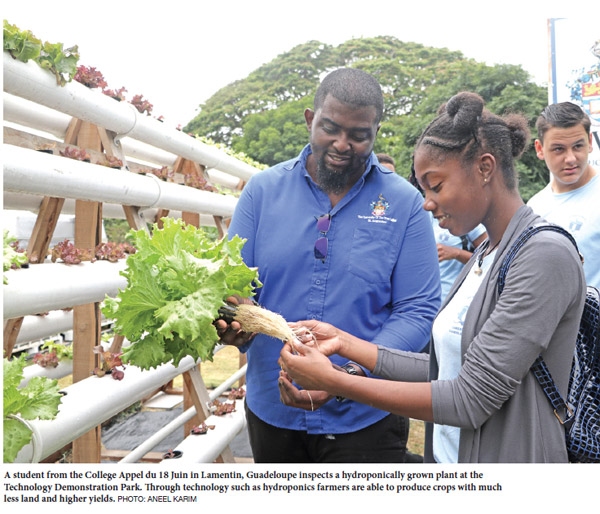
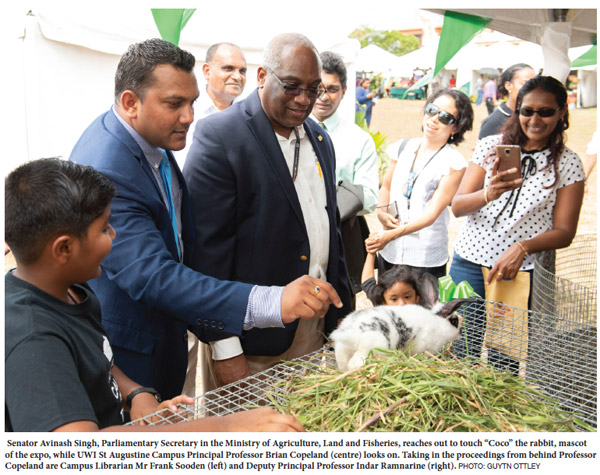
Avah Atherton is a writer and aspiring cultural archivist.
|





